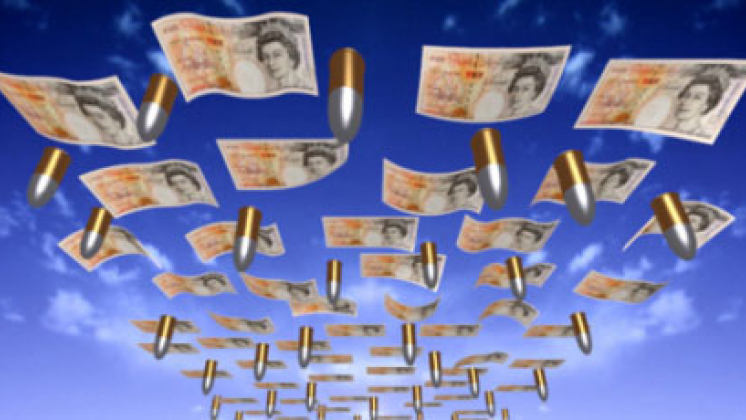The BBC and the arms trade: the scandle no one is talking about
The BBC Trust is “the governing body of the BBC”, with the responsibility to ensure that the Corporation delivers on its mission “to inform, educate and entertain.”
The Trust describes itself as “the guardian of license fee revenue”, aiming to make the Corporation “simpler, more efficient and more open.”
It also sets editorial standards, appoints the Director-General and serves as “the final arbiter on complaints.” Established through the 2006 BBC Royal Charter, the Trust, along with the separate executive board, plays a central role in the governance and regulation of the BBC.
As Dan Hind has written for ourBeeb, the Trust’s members are not, to say the least, chosen democratically. There are twelve trustees – four of whom are charged with representing Britain’s Home Nations, one an International Trustee – all formally appointed by the Queen, on the recommendation of government ministers.
Hind also illustrates how experience in journalism has not exactly been a prerequisite for trustees, with CVs instead distinguished by “strong links with the financial sector”, and roles on the boards of energy companies.
Maybe we shouldn’t find this surprising. We’re now at the point where we expect most of our public institutions to be linked, in some way, to banking. Careers in British public service are often stepping stones to careers in finance, and vice versa.
A similar “revolving door” exists with weapons companies, who also have many friends in important places: from the Ministry of Defence, to the Department of Trade and Investment, and even the House of Windsor. Now, it seems, the arms industry will have a representative at the top of the BBC.
Sir Roger Carr, the chairman of Europe’s biggest arms company, BAE Systems, has recently added “Vice-Chair of the BBC Trust” to his CV.
Carr has been chairman of BAE since February 2014, and “is also a member of the Prime Minister’s Business Advisory Group and a senior advisor to KKR – the world’s largest private equity company.”
Appointed as a trustee on March 20 along with former Radio 4 controller Mark Damazer and former Tory donor and banker Mark Florman, Carr apparently fits with the government’s keenness to “introduce more trustees with business and financial backgrounds.”
What does “business experience” with BAE look like? This is a company perhaps best-known for its role in the 1985 Al-Yamamah arms deal, making £43bn selling warplanes to the Saudi monarchy – with an estimated £6bn “distributed in corrupt commissions, via an array of agents and middlemen.” The Serious Fraud Office began an investigation into the Al-Yamamah deal in 2004, only for its probe to be shut down in December 2006, after alleged Saudi blackmail.
More broadly, BAE’s business model is about selling as many weapons as possible. It has had military customers in over one hundred countries, including but not limited to Hosni Mubarak, the Bahraini royal family and the United Arab Emirates.
As the Campaign Against Arms Trade (CAAT) puts it, BAE “has armed dictatorships and human rights abuses around the world… Its chair should not be paid £70,610 a year to ‘represent license fee payers’ views.’”
With the exception of CAAT, there has been virtually no media discussion of Carr’s appointment (there is also this piece from RT). Clearly, our journalists are so used to the submersion of our public institutions in corporate influence that they no longer seem to notice.
And this, unfortunately, is not the first time we’ve had to ask questions about the BBC and the arms trade. CAAT has previously campaigned (successfully) against plans for BBC political editor, Nick Robinson, and security correspondent, Frank Gardner, to wine and dine with representatives of the arms industry. It has also, in the past, expressed concern over Top Gear’s links with Clarion Events, a company with a history of purchasing and promoting arms fairs.
By bringing BAE’s chairman into such a senior position with the BBC Trust, the government has deeply associated our public broadcaster with an industry known mainly for corruption, bribery and contempt for human rights. This is the real scandal we should be talking about – and fighting.


